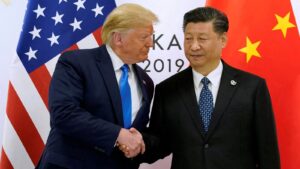|
Getting your Trinity Audio player ready...
|
Satya Nadella, the Chief Executive Officer of Microsoft (MSFT.O), has countered Google’s assertions in a high-stakes antitrust trial against Alphabet (GOOGL.O), labeling Google’s arguments as “bogus.” Nadella’s testimony came during the first major antitrust case pursued by the U.S. Department of Justice since 1998.
At the trial, Nadella revealed that Microsoft had endeavored to establish its Bing search engine as the default option on Apple (AAPL.O) smartphones but was met with rejection. Google’s lead lawyer, John Schmidtlein, probed Nadella about instances when Microsoft did secure default status on computers and mobile devices, only to find users overwhelmingly favoring Google.
Schmidtlein contended that strategic missteps on Microsoft’s part contributed to Bing’s inability to gain a foothold. He cited Microsoft’s failure to invest in servers or engineers to enhance Bing, as well as its inability to recognize the significance of the mobile revolution. Schmidtlein also pointed out that Microsoft’s previous successes in securing default status, such as on some Verizon phones in 2008 and BlackBerry and Nokia devices in 2011, ultimately resulted in users predominantly using Google for their searches.
Nadella acknowledged that, on laptops, where Microsoft operating systems are prevalent, Bing serves as the default search engine but holds a market share of less than 20%.
The government’s case against Google alleges that the tech giant, which commands approximately 90% of the search market, illicitly paid around $10 billion annually to smartphone manufacturers like Apple and wireless carriers such as AT&T (T.N.) to secure its position as the default search engine on their devices. This dominance in the search market has significantly bolstered Google’s profits, primarily through advertising revenue.
Nadella commented on the challenges of changing defaults, noting that it is more straightforward on Windows but considerably more challenging on mobile devices. He emphasized Google’s entrenched position in the search market by quipping, “You get up in the morning, you brush your teeth, and you search on Google.”
Judge Amit Mehta, presiding over the case in the U.S. District Court for the District of Columbia, posed a pivotal question to Nadella. He inquired why Apple would opt for Bing given its purportedly lower quality compared to Google. This query indicates the judge’s interest in Google’s argument that its dominance is a result of quality rather than unlawful practices.
In response, Nadella asserted that Microsoft aimed to demonstrate that Bing engineers could “bridge the quality gap” with access to the vast number of queries conducted on Apple smartphones.
Shifting the focus to the emerging field of artificial intelligence (AI), Nadella testified about the challenges faced by tech giants in amassing extensive content libraries to train their expansive language models. He likened the situation to “the early phases of distribution deals” and shared insights from discussions with publishers regarding competing with Google’s substantial financial commitments.
Nadella assumed the role of Microsoft CEO in 2014, long after the tech giant had confronted its own federal antitrust lawsuit, which was initiated in 1998 and concluded with a settlement in 2001. This legal battle compelled Microsoft to alter certain business practices and paved the way for competitors like Google.
In terms of market capitalization, Microsoft, with approximately $2.3 trillion, currently surpasses Google, which boasts a market capitalization of about $1.7 trillion. The rivalry between the two tech giants, which offer browsers, search engines, email services, and numerous other overlapping products and services, has persisted over the years. More recently, they have become competitors in the realm of artificial intelligence, with Microsoft’s significant investments in OpenAI and Google’s developments like the Bard AI chatbot.



